#i need to find more songs for the donna section where r all the songs abt LOVING YOUR BEST FRIEND FOREVER
Text
me, starting to make the ten playlist: ten is such a specific character that i think it will probably be hard to find songs that fit him
me, 78 songs into the ten playlist: so turns out there's a lot of songs about not being able to love someone and/or failing relationships and/or being really sad and lonely over people leaving you
#this is why the martha section is the longest rn. love loses!#i need to find more songs for the donna section where r all the songs abt LOVING YOUR BEST FRIEND FOREVER#technically i also need to find way more songs for the rose section too but i can just look up tenrose playlists for that#dr who#10 era
9 notes
·
View notes
Text
Your 2018 Spoiler-Free Mega Guide to Albertalli Stuff
Deep breath. Big year. I’ve got lots of cool things coming up, so I’m creating this info-packed timeline to help walk you through it!
Ready?

January 30th
SIMON VS THE HOMO SAPIENS AGENDA: Special Edition Hardcover
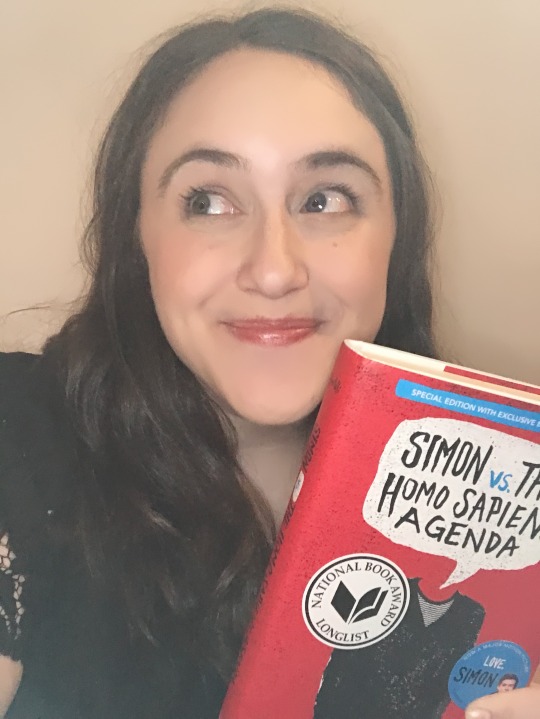
Includes:
- 2 pages of black and white movie set photos from my personal collection
-11 pages of conversation transcript with Angie Thomas, Adam Silvera, and me, including the infamous boner story.

-15-page excerpt from THE UPSIDE OF UNREQUITED
-11-page sneak peek of LEAH ON THE OFFBEAT
- and, of course, 19 pages of Simon and Blue’s very first emails.
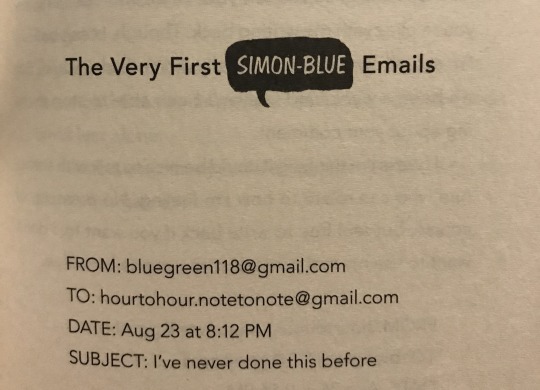
FAQ:
Where can I preorder/purchase this in the US? Links here.
Where can I preorder/purchase this outside the US? Book Depository
Can I order a signed/personalized copy? Yes! Call FoxTale Book Shoppe in Woodstock, GA or email [email protected], and be sure to request that they hold the book for personalization. They can ship internationally for an additional fee.
Will the special edition bonus content be translated into any other languages? I don’t think so - this content was acquired specifically by my US publisher. I’m so sorry for any frustration!
Will the bonus content be available electronically? As far as I know, no.
Did you write the bonus emails? Yes.
Did you really tell Nick Robinson to enjoy his boner? Yes.

Also January 30th
SIMON VS THE HOMO SAPIENS AGENDA: Movie Tie-in Paperback

Includes:
-9 pages of me in conversation with Greg Berlanti and Nick Robinson

-4 pages of black and white official stills from the film
-7 page excerpt from the LOVE, SIMON script

-6 page excerpt from THE UPSIDE OF UNREQUITED
-8-page sneak peek of LEAH ON THE OFFBEAT
FAQ:
Where can I preorder/purchase this in the US? Links here.
Where can I preorder/purchase this in the UK/AUS/NZ? Links here. (PLEASE NOTE: At this time, I cannot verify what bonus content may or may not be included in the UK edition.)
Where can I preorder/purchase the US edition in other countries? Book Depository
Can I order a signed/personalized copy? Yes! Call FoxTale Book Shoppe in Woodstock, GA or email [email protected], and be sure to request that they hold the book for personalization. They can ship internationally for an additional fee.
Will the MTI bonus content be translated into any other languages? I don’t think so - this content was acquired specifically by my US publisher. I’m so sorry for any frustration!
Is the text of the book the same as other editions of SIMON VS THE HOMO SAPIENS AGENDA? Yup, same book!
Will this edition include the Simon/Blue bonus emails as well? No - that’s only in the Special Edition Hardcover.
Will the bonus content be available electronically? As far as I know, no.
Why is the LEAH sneak peek shorter in this edition than in the Special Edition Hardcover and UPSIDE paperback? It’s the same chapter, but it cuts off sooner. This is a different edition with different content.
Can Nick actually sing? Yes.
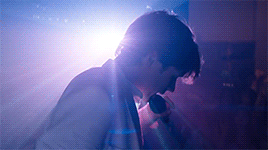
Also January 30th
THE UPSIDE OF UNREQUITED: paperback edition!

Includes:
-11 page sneak peek of LEAH ON THE OFFBEAT
FAQ:
Where can I preorder/purchase this in the US? Links here.
Where can I preorder/purchase this outside the US? Book Depository
I’m confused - my copy of UPSIDE has always been a paperback. You probably have the UK/AUS/NZ edition, which has been paperback from the beginning.
Can I order a signed/personalized copy? Yes! Call FoxTale Book Shoppe in Woodstock, GA or email [email protected], and be sure to request that they hold the book for personalization. They can ship internationally for an additional fee.
Will I still be able to purchase THE UPSIDE OF UNREQUITED in hardcover if I want. Yes!
Do I need to read SIMON VS before reading UPSIDE? No. You’ll miss a few Easter eggs and references, and UPSIDE occurs chronologically after SIMON in the same universe - but UPSIDE does not spoil Simon (and Simon’s love interest is not mentioned by name in UPSIDE). Many people have read UPSIDE first.
Does this edition include the recipe for edible cookie dough? Nope. Google it!

March 16th
LOVE, SIMON releases in the US!
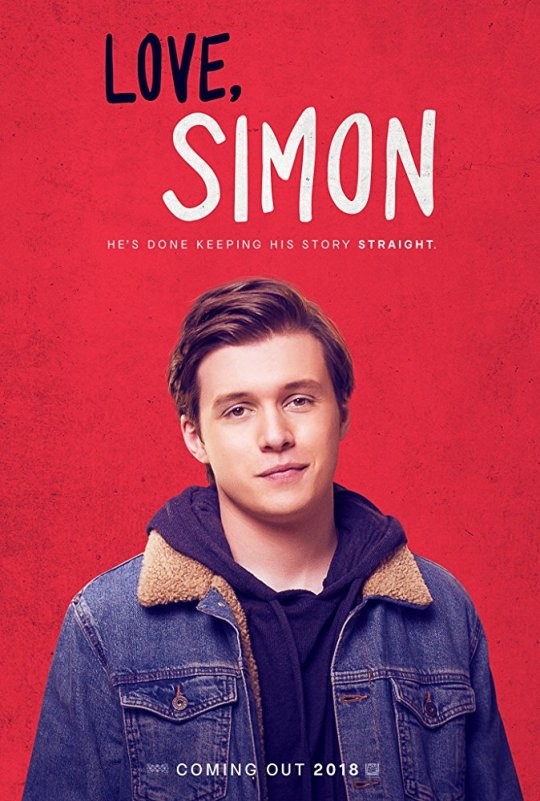
Trailers:
Full length
Teaser
FAQ:
Is LOVE, SIMON based on a book? Yes. It’s based on my book, SIMON VS THE HOMO SAPIENS AGENDA.
(This is, in fact, a frequently asked question.)
Is the film being released in my country? I’m afraid I’m not given up-to-date information on international release dates. It is being released widely, and dates have been set for many countries. However, changes to release dates are common, and I’m unable to keep up with that info for every country. I recommend checking IMDB and/or the major film distribution outlets in your country.
How involved were you in the creative process for LOVE, SIMON? Are you happy with the film? My team was very collaborative, and I obsessively love this film. Check out my film-specific FAQ here.
Will there be any early screenings in my city? I’m not involved in organizing screenings, and I usually don’t have up-to-date information on this.
Is Blue’s identity the same in the film? Yes.
Something from the trailer looks different from the book. WHY??? Check out my film-specific FAQ here.
Have you seen the film yet? Yes, and it’s even better than you think it is.
What songs are on the soundtrack? Check out this writeup in EW and preorder the soundtrack here!
Tell me about the cast and crew of the film. Check out my film-specific FAQ here.
Will there be merch?! I don’t know! Hopefully?
Do I need to read the book before I watch the film? I can’t make you, but I hope you'll check out the book either before or after the film!
Would you consider making a film of UPSIDE, LEAH, or WHAT IF IT’S US? I have no control over whether a film gets made of any of my books. I’m sorry!
April 24th
LEAH ON THE OFFBEAT: hardcover
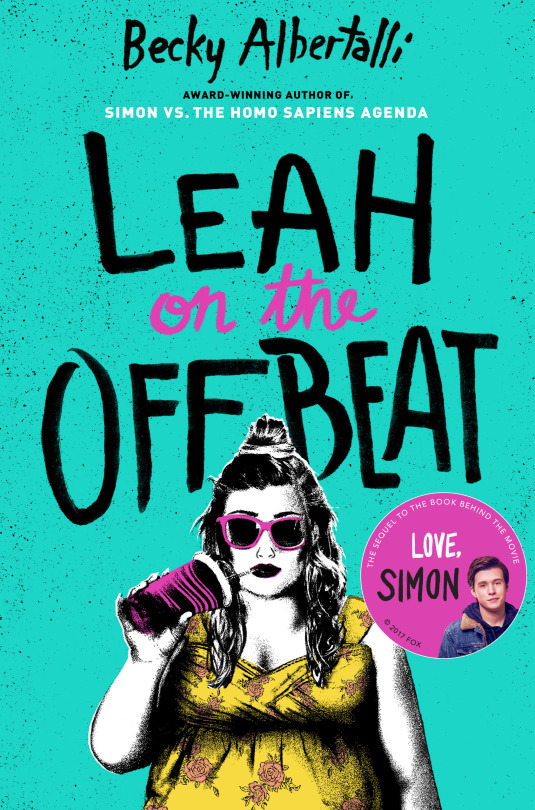
FAQ:
Where can I preorder/purchase this in the US? Links here.
Will it be available in the UK/AUS/NZ at the same time? Yup, via Penguin UK - I just don’t have a link yet.
What about other countries? Translation rights for LEAH ON THE OFFBEAT have already been acquired by multiple countries, but I don’t have updated information yet on their publication dates, covers, and purchase links. In the meantime, you can preorder the English language version from Book Depository.
Can I order a signed/personalized copy? Yes! Call FoxTale Book Shoppe in Woodstock, GA or email [email protected], and be sure to request that they hold the book for personalization. They can ship internationally for an additional fee. There will also be copies signed without personalization at several retailers.
Do I need to read SIMON VS before I read LEAH ON THE OFFBEAT? What about THE UPSIDE OF UNREQUITED? You’ll probably want to read SIMON before LEAH, since Leah’s story is a fairly direct sequel to Simon’s. LEAH definitely spoils the ending of SIMON VS. You’ll miss a few Easter eggs if you haven’t read UPSIDE yet, but it’s not necessary to read UPSIDE first.
Can you send me an advance reader copy of LEAH ON THE OFFBEAT? No ARCs will be available for this book. It’s embargoed until its release date.
Will you be touring for this book? I will be, but I don’t have updated information on that yet.
Will Simon and the rest of the Creekwood High School gang make an appearance in this book? Yes - basically every character you know from SIMON VS makes at least a short appearance. Most make significant appearances. Simon in particular plays a very large role.
I heard Leah might be bi. Is that true? Yup! She’s bi (Simon doesn’t know yet, which is why it’s not mentioned in his book). That said, this book is not about her discovering or coming to terms with bisexuality. She has known she was bi since age eleven.
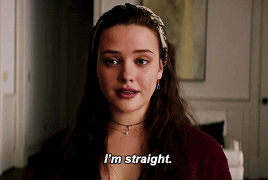
Nope, you’re not.
Is Leah fat in the book? Yes.
Will you write about <insert character> next? No, it’s very unlikely. The Creekwood gang are graduating seniors in this book, so it feels like a very natural ending point for the Simonverse.

October 9th
WHAT IF IT’S US hardcover, co-written with Adam Silvera

FAQ:
Where can I preorder/purchase this in the US? So far, here!
Will it be available outside the US? Translation rights for WHAT IF IT’S US have already been acquired by multiple countries, but I don’t have updated information yet on their publication dates, covers, and purchase links. In the meantime, you can preorder the US version from Book Depository.
What imprint of HarperCollins is publishing WHAT IF IT’S US? We have two imprints and two editors! WIIU is both a Balzer + Bray book and a HarperTeen book.

Here’s the team! Editor Donna Bray (who has edited all of my books), agent Brooks Sherman, a tall dude, and editor Andrew Eliopulos (who edited Adam’s THEY BOTH DIE AT THE END).
Who wrote Arthur’s sections, and who wrote Ben’s? If you don’t already know, you’ll get a clue in the first line of the book.
Did you know your title is a lyric from a song in DEAR EVAN HANSEN? Yup, that’s intentional.
Will it have a Becky ending or an Adam ending? You’ll have to read to find out! (Seriously, though, if you need to know about possible triggering moments in the book, reach out - we can give more information if you need it to be safe!)
Can I get an Advance Reader Copy? No ARCs are available yet. When they’re available, please reach out to HarperCollins (we won’t be handling ARC requests directly).
Will you be touring for WHAT IF IT’S US? Yes, but we don’t have the details on that yet.
Will this book contain kissing? OH YES.
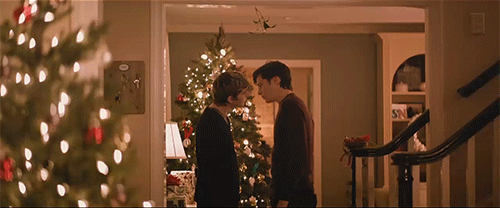
December TBA
DEAR HEARTBREAK: YA AUTHORS ON THE DARK SIDE OF LOVE (anthology edited by Heather Demetrios)

No FAQ yet, but learn more about this anthology here!
General FAQ:
Will we get a book written from Blue’s POV? No, that’s very unlikely. However, check out this series by Bansheee on Ao3, which is what I would have written, only better. SPOILERS!! Seriously, check out Ao3 for so much incredible, original work in the Simonverse.
Please follow me on Twitter! I’m so sorry - I don’t respond to any follow requests. It’s not personal at all, I promise.
Do you ever intend to write a book about a character from <a particular marginalized community>? This gets complicated! I’ll never say never, but I always want to make sure I can do this character justice before I attempt to write from their POV. For many marginalized communities, mainstream YA representation is so scarce that I am mindful of how much space I’d be taking up by writing outside my lane. That said, writing diverse casts of characters is incredibly important to me, and I hope to get better and better at including thoughtful, nuanced rep of a broad range of communities. It’s also REALLY important to me to read widely and boost the amazing (often #ownvoices - hashtag cr: Corinne Duyvis) work other authors have already put out there. A few fantastic resources: LGBTQReads, Latinx In KidLit, We Need Diverse Books, American Indians In Children’s Literature, Coretta Scott King Book Awards list, Disability in Kidlit, and Rich In Color.
You haven’t replied to my email yet! I know - I’m sorry! I’m super behind. I get lots and lots of emails, and every single one of them makes my day. I will hopefully have the chance to write back to each of the personal ones eventually.
I have a question that wasn’t addressed in this post. Where’s the best place to ask it? Email my assistant, Matthew, at albertalli.requests at gmail.com. He’s much quicker to reply than I am, AND he’s awesome, AND he knows everything.
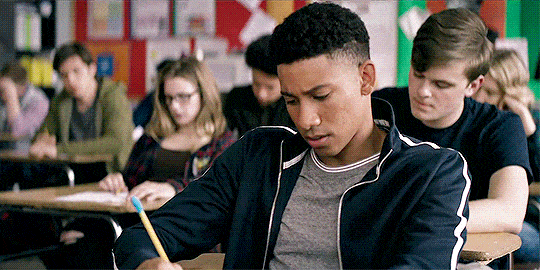
That is literally Matthew sitting behind Bram Greenfeld. He’s in the movie!
Okay, y’all! That’s the latest. I love you, thanks for reading this far, and don’t forget:
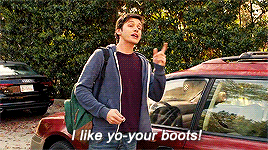
youtube
youtube
youtube
youtube
#Becky Albertalli#simon vs#love Simon#the upside of unrequited#leah on the offbeat#what if its us#dear heartbreak#faq#adam silvera
479 notes
·
View notes
Note
the square numbers for the books ask?
Hahhahaha so my dumb ass had to go and Google what square numbers were because I haven’t done maths in 2 years. THING IS, I’ve done some of them already so I just got the number above that I hadn’t done (I do know now what square numbers are, I’m not just completely ditzing out in maths hahahahahah):
2. What is the longest book you have ever read? How many pages?
One of the George R. R. Martin Song of Ice and Fire ones. Possibly the fourth one. That was pretty long. Or at least it felt long. Too long. It just. Wouldn’t end.
Needless to say that was the last ASIOAF book I read and now I just hate on GRRM’s portrayal of women and his editor’s inability to effectively cut down boring passages/bad boob metaphors from afar.
4. What is a book series that everyone else loves but you do not?
Series is hard to say cos I don’t read many series, and I wouldn’t necessarily say that I actively dislike ASIOAF (I think the plot is interesting and I enjoy the historical inspiration, but I think GRRM……..needs to rethink how he writes).
So if we just say books in general, I will say that I utterly absolutely despise Kevin Kwan’s Crazy Rich Asians (it’s getting made into a movie with a really stellar cast and I’m in two minds about it because the book was so shit), I think J.D. Salinger’s Catcher in the Rye is overrated to the nth degree and just didn’t understand the point of it (my pastor said that Holden Caulfield was like me, not as an insult, but I was offended nonetheless), I actually don’t like The Picture of Dorian Gray because I find Wilde too self-indulgent and it was at times misogynistic, and I don’t really like Austen in general (it’s just the way she writes though. I very rarely enjoy pre-19th century prose).
12. What book do you passionately hate?
Crazy Rich Asians (see above), but I also did write a 2000 word rant once on Donna Tartt’s The Goldfinch so that possibly exhibits more passion (the rant against Crazy Rich Asians was only 1000 words). I think mostly I was just disappointed with how subpar it was, since we all know that Tartt can write better than that.
16. What book made you laugh?
Most of them make me laugh. Jasper Fforde is by far the funniest author; he has a penchant for terrible puns which is basically my sense of humour. I would say that The Woman Who Died a Lot is his funniest, mostly because when I read it I literally had to close the book every few pages to laugh (it’s something about the noun “smiting”. it’s just so indescribably funny).
25. How many books do you own?
A lot. More than fifty, maybe pushing a hundred? I’m not entirely sure; all I know is that they don’t fit on my bookshelf and I keep buying more despite not having enough money or shelf space. Hah.
36. What is a book you love that has a terrible trope? (Love triangle, etc)
OOH I love Mary Renault’s The Charioteer but it has a love triangle!!! (I’m only salty because it doesn’t turn out the way I wanted it to. But I understand why she did it. The sad thing is that I do.)
I mean most books have terrible tropes but they can still be twisted around for the good of humankind. Like I adore The Lord of the Rings but we can’t deny that it’s chock full of tropes, good and bad… And if we even cross into fanfiction there are so many fanfic tropes that I hate, but there are writers who can twist them around so deftly to make them work. And I think that’s where a written work’s value lies; how you twist the unoriginal into something uniquely yours.
49. What book has inspired you?
Most recently, it would be James Joyce’s Dubliners, which is an absolute masterwork. I kind of wanted to write vaugely autobiographical poetry using the story titles as section markers and do it in dactylic hexameter. It was kind of meant to be a reverse-Ulysses in that Ulysses takes the general storyline of the epic and makes it prose set in modern Ireland, and I wanted to take the modern Ireland prose and make it contemporary Australian epic verse… I mean, the project is still yet to take off because dactylic hexameters are pretty damn hard to write in English. lmao
Thank youuuuuu for popping by!
3 notes
·
View notes
Text
Recap: 50 years of LGBTQ+ Revolution Across the Globe
Before talking about the LGBTQ revolution, not more than 20 percent of the world’s population is aware that this abbreviation, commonly referred to as the ‘LGBTQ’ is not just it, it actually is LGBTQIA+, where Q stands for queer, I stands for intersex, A stands for ally, and the plus symbol that has defeated stereotypes is for anyone other than these category, worthy of living a life as a normal person and not to be looked down upon by the society.
Earlier, Q meant “questioning” for the people who were uncertain of their gender identity and sexual orientation, but with time, it has casted off its dergoatory essence and has started to be termed as ‘queer’. These letters were an advancement or evolution so to speak towards incorporation – a development in the language used to identify a divergent cluster of people that had regularly quite recently been classified “the gay community.”
Fifty years back, the now positive LGBTQ development groups burst onto the scene. Mass displeasure at the suppression of LGBTQ individuals had been rising under the surface. It detonated at the Stonewall Inn, a gay bar in New York City’s Greenwich Village. A standard police strike on June 28, 1969 swelled into a five-day rebel movement in the lanes that sent resonations of “Gay Power” over the world. Roused by the gigantic movements occurring in the public arena at the time with the dark opportunity and female’ freedom developments, the Stonewall mobs fought a battle against the framework for the privilege to live straightforwardly and securely. Stonewall was a defining moment for LGBTQ battle in the U.S. Moreover, Stonewall was not the first of these mobs; earlier instances of rioting by comparative clashes between the LGBTQ people group and the police over the U.S. all through the 1960s, incorporating encounters in Los Angeles, San Francisco and Philadelphia.
Stonewall was a critical point of change in this political network. It plotted the scope of political issues of LGBTQ activists during the 1960s, including harrasment by police, abuse and exploitaion, oppression of homosexuality and the bad form of sodomy laws. It likewise called upon the mass of the LGBTQ group to get politically included, seizing on Stonewall as a motivation to rally – and subsequently encouraged us to better comprehend, after 50 years, the importance of that rebellion and the need of the hour. It was anything but a start, as it appeared however it was the beginning of something new.
On Saturday, June 27, 1970, Chicago Gay Liberation held a walk from Washington Square Park to the Water Tower at the crossing point of Michigan and Chicago roads, which was the course initially arranged, and after that a large number of the members spontaneously walked on to join the march. The date was picked in light of the fact that the Stonewall occasions started on the last Saturday of June and on the grounds that coordinators needed to achieve the greatest number of Michigan Avenue interestees.The following year, Gay Pride walks occurred in Boston, Dallas, Milwaukee, London, Paris, West Berlin, and Stockholm. By 1972 the active urban communities included Atlanta, Brighton, Buffalo, Detroit, Washington D.C., Miami, and Philadelphia, just as San Francisco.
The month of June was picked as LGBT Pride Month to celebrate the Stonewall riots, which happened towards the last days of June 1969. Therefore, many pride occasions are held (now even with active participation in our own country, India) during this month to perceive the effect LGBT individuals have had on the planet.
Active Opposition
Spain– In a 2008 meeting for the book ‘The Queen Up Close’ by Spanish columnist and author Pilar Urbano, Queen Sofía of Spain started off a debate by voicing her objection to LGBT pride notwithstanding her official obligations as an individual from the Royal Family by rebuking the Spanish Law on Marriage.
Turkey– In 2015, after the police faced itself defeated in front of the mob, they used tear gas and rubber bullets as a peacekeeping move. Similarly in the consecutive year, the Governor Office in Istanbul did not allow pride parades to be held under the pretext of securing national peace and security.
Such instances are countess, disheartening and aggravating.
In the wake of recognizing that circumstances are different significantly for its own betterment, there are still “guardians who feel their gay children are genuinely sick or mental”, andl therapists over the world who stick to the old view that homosexuality is a “psychological sickness”.
The Indian Perspective
Today, although the Supreme Court of India, has in a landmark judgement in the case Joseph Shine v. Union of India, has decriminalised homosexuality under section 377 of the Indian Penal Code, it is only a first stepping stone towards acheiving acceptance of homosexual people by the Indian society. Following is the summary of some landmark cases in which the judges have opined in favour of the LGBTQIA+ community.
In the case- National Legal Services Authority v. Union of India and others, it was laid down that “gender identification is an essential component which is required for enjoying civil rights by the community. It is only with this recognition that many rights attached to the sexual recognition as ―third gender‖ would be available to the said community more meaningfully viz. the right to vote, the right to own property, the right to marry, the right to claim formal identity through a passport and a ration card, a driver‘s licence, the right to education, employment, health and so on
Joseph Shine v Union of India- The then Chief Justice of India, Justice Dipak Misra said, “Section 377 is irrational, arbitrary and incomprehensible as it fetters the right to equality for LGBT community. LGBT community possesses the same equality as other citizens. The right to privacy as part of right to life applies fully to the LGBT community.”
“Punishment under Section 377 made the LGBT a closeted community, destroyed the identity of members and reached their dignity, all part of right to life. The state has no business to get into controlling the private lives of LGBT community or for that matter of any citizen.”- said Justice D. Y. Chandrachud.
Navtej Singh Johar v Union of India- Navtej Johar, a dancer who identified himself as an individual belonging to the LGBT community filed a writ petition before the Supreme Court, challenging the constitutionality of section 377, and demanding “recognition of the right to sexuality, right to sexual autonomy and right to choice of a sexual partner to be part of the right to life guaranteed by Art. 21 of the Constitution of India”.
The bench delivered a judgement relying on the principles of “transformative constitutionalism and progressive realization of rights to hold that the constitution must guide society’s transformation from an archaic to a pragmatic society where fundamental rights are fiercely guarded”. The bench further stated, “constitutional morality would prevail over social morality”.
In recent times, the Courts have laid emphasis on the fact that being a homosexual is not an aberration but a variance of sexual orientation. So what if a person is not “straight” and belongs to the LGBT, what is the logic behind not accepting him or her as a normal individual. Who has given the society the right to seclude such people, violate their fundamental rights, and look down upon them?
Unnoticed, yet essential facets of the LGBTQIA+
LGBTQ+ individuals have dependably been at pop’s gunpoint, as entertainers and spectators. The historical backdrop of popular music is strange history. Blues originators like Ma Rainey and Bessie Smith, both transparently and openly bisexual, helped plant the foundation stone of what might move toward becoming R&B and rock’n’roll.
During the end of the Great Depression in the mid thirties, the people in charge closed down many of the gay clubs and officially criminalized gay sex at a scale that had never before been seen.The “coming out of the closet”, which hadn’t even existed as everyone knows it now, slammed shut. Nevertheless, it did not stop musicians from shaping the pop LGBTQ culture. Following is a list of songs that have had an impact on a landmass of people who used to be stereotyped-
Roberta Flack -“Ballad of the Sad Young Men”
Wendy Carlos- “March From a Clockwork Orange”
Madeline Davis- “Stonewall Nation”
Lou Reed- “Walk on the Wild Side”
Donna Summer- “I Feel Love”
Fanny- “Charity Ball”
“Rufus was singing to a man. I knew before the song even started. I didn’t have to guess or hope, I didn’t have to work with or bend his music to find myself in it. This was so foreign to me at 16 and was such an incredible, full body-and-spirit relief. He even sounded gay. Beyond what it meant and still means to me, it’s just a brilliant and beautiful record.”
Mike Hadreas on Rufus Wainwright’s “In My Arms”
Sources
https://bbc.in/2WY6164
http://bit.ly/2QTZVhe
http://bit.ly/2WJniQj
The post Recap: 50 years of LGBTQ+ Revolution Across the Globe appeared first on Legal Desire.
Recap: 50 years of LGBTQ+ Revolution Across the Globe published first on https://immigrationlawyerto.tumblr.com/
0 notes
Text
Recap: 50 years of LGBTQ+ Revolution Across the Globe
Before talking about the LGBTQ revolution, not more than 20 percent of the world’s population is aware that this abbreviation, commonly referred to as the ‘LGBTQ’ is not just it, it actually is LGBTQIA+, where Q stands for queer, I stands for intersex, A stands for ally, and the plus symbol that has defeated stereotypes is for anyone other than these category, worthy of living a life as a normal person and not to be looked down upon by the society.
Earlier, Q meant “questioning” for the people who were uncertain of their gender identity and sexual orientation, but with time, it has casted off its dergoatory essence and has started to be termed as ‘queer’. These letters were an advancement or evolution so to speak towards incorporation – a development in the language used to identify a divergent cluster of people that had regularly quite recently been classified “the gay community.”
Fifty years back, the now positive LGBTQ development groups burst onto the scene. Mass displeasure at the suppression of LGBTQ individuals had been rising under the surface. It detonated at the Stonewall Inn, a gay bar in New York City’s Greenwich Village. A standard police strike on June 28, 1969 swelled into a five-day rebel movement in the lanes that sent resonations of “Gay Power” over the world. Roused by the gigantic movements occurring in the public arena at the time with the dark opportunity and female’ freedom developments, the Stonewall mobs fought a battle against the framework for the privilege to live straightforwardly and securely. Stonewall was a defining moment for LGBTQ battle in the U.S. Moreover, Stonewall was not the first of these mobs; earlier instances of rioting by comparative clashes between the LGBTQ people group and the police over the U.S. all through the 1960s, incorporating encounters in Los Angeles, San Francisco and Philadelphia.
Stonewall was a critical point of change in this political network. It plotted the scope of political issues of LGBTQ activists during the 1960s, including harrasment by police, abuse and exploitaion, oppression of homosexuality and the bad form of sodomy laws. It likewise called upon the mass of the LGBTQ group to get politically included, seizing on Stonewall as a motivation to rally – and subsequently encouraged us to better comprehend, after 50 years, the importance of that rebellion and the need of the hour. It was anything but a start, as it appeared however it was the beginning of something new.
On Saturday, June 27, 1970, Chicago Gay Liberation held a walk from Washington Square Park to the Water Tower at the crossing point of Michigan and Chicago roads, which was the course initially arranged, and after that a large number of the members spontaneously walked on to join the march. The date was picked in light of the fact that the Stonewall occasions started on the last Saturday of June and on the grounds that coordinators needed to achieve the greatest number of Michigan Avenue interestees.The following year, Gay Pride walks occurred in Boston, Dallas, Milwaukee, London, Paris, West Berlin, and Stockholm. By 1972 the active urban communities included Atlanta, Brighton, Buffalo, Detroit, Washington D.C., Miami, and Philadelphia, just as San Francisco.
The month of June was picked as LGBT Pride Month to celebrate the Stonewall riots, which happened towards the last days of June 1969. Therefore, many pride occasions are held (now even with active participation in our own country, India) during this month to perceive the effect LGBT individuals have had on the planet.
Active Opposition
Spain– In a 2008 meeting for the book ‘The Queen Up Close’ by Spanish columnist and author Pilar Urbano, Queen Sofía of Spain started off a debate by voicing her objection to LGBT pride notwithstanding her official obligations as an individual from the Royal Family by rebuking the Spanish Law on Marriage.
Turkey– In 2015, after the police faced itself defeated in front of the mob, they used tear gas and rubber bullets as a peacekeeping move. Similarly in the consecutive year, the Governor Office in Istanbul did not allow pride parades to be held under the pretext of securing national peace and security.
Such instances are countess, disheartening and aggravating.
In the wake of recognizing that circumstances are different significantly for its own betterment, there are still “guardians who feel their gay children are genuinely sick or mental”, andl therapists over the world who stick to the old view that homosexuality is a “psychological sickness”.
The Indian Perspective
Today, although the Supreme Court of India, has in a landmark judgement in the case Joseph Shine v. Union of India, has decriminalised homosexuality under section 377 of the Indian Penal Code, it is only a first stepping stone towards acheiving acceptance of homosexual people by the Indian society. Following is the summary of some landmark cases in which the judges have opined in favour of the LGBTQIA+ community.
In the case- National Legal Services Authority v. Union of India and others, it was laid down that “gender identification is an essential component which is required for enjoying civil rights by the community. It is only with this recognition that many rights attached to the sexual recognition as ―third gender‖ would be available to the said community more meaningfully viz. the right to vote, the right to own property, the right to marry, the right to claim formal identity through a passport and a ration card, a driver‘s licence, the right to education, employment, health and so on
Joseph Shine v Union of India- The then Chief Justice of India, Justice Dipak Misra said, “Section 377 is irrational, arbitrary and incomprehensible as it fetters the right to equality for LGBT community. LGBT community possesses the same equality as other citizens. The right to privacy as part of right to life applies fully to the LGBT community.”
“Punishment under Section 377 made the LGBT a closeted community, destroyed the identity of members and reached their dignity, all part of right to life. The state has no business to get into controlling the private lives of LGBT community or for that matter of any citizen.”- said Justice D. Y. Chandrachud.
Navtej Singh Johar v Union of India- Navtej Johar, a dancer who identified himself as an individual belonging to the LGBT community filed a writ petition before the Supreme Court, challenging the constitutionality of section 377, and demanding “recognition of the right to sexuality, right to sexual autonomy and right to choice of a sexual partner to be part of the right to life guaranteed by Art. 21 of the Constitution of India”.
The bench delivered a judgement relying on the principles of “transformative constitutionalism and progressive realization of rights to hold that the constitution must guide society’s transformation from an archaic to a pragmatic society where fundamental rights are fiercely guarded”. The bench further stated, “constitutional morality would prevail over social morality”.
In recent times, the Courts have laid emphasis on the fact that being a homosexual is not an aberration but a variance of sexual orientation. So what if a person is not “straight” and belongs to the LGBT, what is the logic behind not accepting him or her as a normal individual. Who has given the society the right to seclude such people, violate their fundamental rights, and look down upon them?
Unnoticed, yet essential facets of the LGBTQIA+
LGBTQ+ individuals have dependably been at pop’s gunpoint, as entertainers and spectators. The historical backdrop of popular music is strange history. Blues originators like Ma Rainey and Bessie Smith, both transparently and openly bisexual, helped plant the foundation stone of what might move toward becoming R&B and rock’n’roll.
During the end of the Great Depression in the mid thirties, the people in charge closed down many of the gay clubs and officially criminalized gay sex at a scale that had never before been seen.The “coming out of the closet”, which hadn’t even existed as everyone knows it now, slammed shut. Nevertheless, it did not stop musicians from shaping the pop LGBTQ culture. Following is a list of songs that have had an impact on a landmass of people who used to be stereotyped-
Roberta Flack -“Ballad of the Sad Young Men”
Wendy Carlos- “March From a Clockwork Orange”
Madeline Davis- “Stonewall Nation”
Lou Reed- “Walk on the Wild Side”
Donna Summer- “I Feel Love”
Fanny- “Charity Ball”
“Rufus was singing to a man. I knew before the song even started. I didn’t have to guess or hope, I didn’t have to work with or bend his music to find myself in it. This was so foreign to me at 16 and was such an incredible, full body-and-spirit relief. He even sounded gay. Beyond what it meant and still means to me, it’s just a brilliant and beautiful record.”
Mike Hadreas on Rufus Wainwright’s “In My Arms”
Sources
https://bbc.in/2WY6164
http://bit.ly/2QTZVhe
http://bit.ly/2WJniQj
The post Recap: 50 years of LGBTQ+ Revolution Across the Globe appeared first on Legal Desire.
Recap: 50 years of LGBTQ+ Revolution Across the Globe published first on https://immigrationlawyerto.tumblr.com/
0 notes
Text
Recap: 50 years of LGBTQ+ Revolution Across the Globe
Before talking about the LGBTQ revolution, not more than 20 percent of the world’s population is aware that this abbreviation, commonly referred to as the ‘LGBTQ’ is not just it, it actually is LGBTQIA+, where Q stands for queer, I stands for intersex, A stands for ally, and the plus symbol that has defeated stereotypes is for anyone other than these category, worthy of living a life as a normal person and not to be looked down upon by the society.
Earlier, Q meant “questioning” for the people who were uncertain of their gender identity and sexual orientation, but with time, it has casted off its dergoatory essence and has started to be termed as ‘queer’. These letters were an advancement or evolution so to speak towards incorporation – a development in the language used to identify a divergent cluster of people that had regularly quite recently been classified “the gay community.”
Fifty years back, the now positive LGBTQ development groups burst onto the scene. Mass displeasure at the suppression of LGBTQ individuals had been rising under the surface. It detonated at the Stonewall Inn, a gay bar in New York City’s Greenwich Village. A standard police strike on June 28, 1969 swelled into a five-day rebel movement in the lanes that sent resonations of “Gay Power” over the world. Roused by the gigantic movements occurring in the public arena at the time with the dark opportunity and female’ freedom developments, the Stonewall mobs fought a battle against the framework for the privilege to live straightforwardly and securely. Stonewall was a defining moment for LGBTQ battle in the U.S. Moreover, Stonewall was not the first of these mobs; earlier instances of rioting by comparative clashes between the LGBTQ people group and the police over the U.S. all through the 1960s, incorporating encounters in Los Angeles, San Francisco and Philadelphia.
Stonewall was a critical point of change in this political network. It plotted the scope of political issues of LGBTQ activists during the 1960s, including harrasment by police, abuse and exploitaion, oppression of homosexuality and the bad form of sodomy laws. It likewise called upon the mass of the LGBTQ group to get politically included, seizing on Stonewall as a motivation to rally – and subsequently encouraged us to better comprehend, after 50 years, the importance of that rebellion and the need of the hour. It was anything but a start, as it appeared however it was the beginning of something new.
On Saturday, June 27, 1970, Chicago Gay Liberation held a walk from Washington Square Park to the Water Tower at the crossing point of Michigan and Chicago roads, which was the course initially arranged, and after that a large number of the members spontaneously walked on to join the march. The date was picked in light of the fact that the Stonewall occasions started on the last Saturday of June and on the grounds that coordinators needed to achieve the greatest number of Michigan Avenue interestees.The following year, Gay Pride walks occurred in Boston, Dallas, Milwaukee, London, Paris, West Berlin, and Stockholm. By 1972 the active urban communities included Atlanta, Brighton, Buffalo, Detroit, Washington D.C., Miami, and Philadelphia, just as San Francisco.
The month of June was picked as LGBT Pride Month to celebrate the Stonewall riots, which happened towards the last days of June 1969. Therefore, many pride occasions are held (now even with active participation in our own country, India) during this month to perceive the effect LGBT individuals have had on the planet.
Active Opposition
Spain– In a 2008 meeting for the book ‘The Queen Up Close’ by Spanish columnist and author Pilar Urbano, Queen Sofía of Spain started off a debate by voicing her objection to LGBT pride notwithstanding her official obligations as an individual from the Royal Family by rebuking the Spanish Law on Marriage.
Turkey– In 2015, after the police faced itself defeated in front of the mob, they used tear gas and rubber bullets as a peacekeeping move. Similarly in the consecutive year, the Governor Office in Istanbul did not allow pride parades to be held under the pretext of securing national peace and security.
Such instances are countess, disheartening and aggravating.
In the wake of recognizing that circumstances are different significantly for its own betterment, there are still “guardians who feel their gay children are genuinely sick or mental”, andl therapists over the world who stick to the old view that homosexuality is a “psychological sickness”.
The Indian Perspective
Today, although the Supreme Court of India, has in a landmark judgement in the case Joseph Shine v. Union of India, has decriminalised homosexuality under section 377 of the Indian Penal Code, it is only a first stepping stone towards acheiving acceptance of homosexual people by the Indian society. Following is the summary of some landmark cases in which the judges have opined in favour of the LGBTQIA+ community.
In the case- National Legal Services Authority v. Union of India and others, it was laid down that “gender identification is an essential component which is required for enjoying civil rights by the community. It is only with this recognition that many rights attached to the sexual recognition as ―third gender‖ would be available to the said community more meaningfully viz. the right to vote, the right to own property, the right to marry, the right to claim formal identity through a passport and a ration card, a driver‘s licence, the right to education, employment, health and so on
Joseph Shine v Union of India- The then Chief Justice of India, Justice Dipak Misra said, “Section 377 is irrational, arbitrary and incomprehensible as it fetters the right to equality for LGBT community. LGBT community possesses the same equality as other citizens. The right to privacy as part of right to life applies fully to the LGBT community.”
“Punishment under Section 377 made the LGBT a closeted community, destroyed the identity of members and reached their dignity, all part of right to life. The state has no business to get into controlling the private lives of LGBT community or for that matter of any citizen.”- said Justice D. Y. Chandrachud.
Navtej Singh Johar v Union of India- Navtej Johar, a dancer who identified himself as an individual belonging to the LGBT community filed a writ petition before the Supreme Court, challenging the constitutionality of section 377, and demanding “recognition of the right to sexuality, right to sexual autonomy and right to choice of a sexual partner to be part of the right to life guaranteed by Art. 21 of the Constitution of India”.
The bench delivered a judgement relying on the principles of “transformative constitutionalism and progressive realization of rights to hold that the constitution must guide society’s transformation from an archaic to a pragmatic society where fundamental rights are fiercely guarded”. The bench further stated, “constitutional morality would prevail over social morality”.
In recent times, the Courts have laid emphasis on the fact that being a homosexual is not an aberration but a variance of sexual orientation. So what if a person is not “straight” and belongs to the LGBT, what is the logic behind not accepting him or her as a normal individual. Who has given the society the right to seclude such people, violate their fundamental rights, and look down upon them?
Unnoticed, yet essential facets of the LGBTQIA+
LGBTQ+ individuals have dependably been at pop’s gunpoint, as entertainers and spectators. The historical backdrop of popular music is strange history. Blues originators like Ma Rainey and Bessie Smith, both transparently and openly bisexual, helped plant the foundation stone of what might move toward becoming R&B and rock’n’roll.
During the end of the Great Depression in the mid thirties, the people in charge closed down many of the gay clubs and officially criminalized gay sex at a scale that had never before been seen.The “coming out of the closet”, which hadn’t even existed as everyone knows it now, slammed shut. Nevertheless, it did not stop musicians from shaping the pop LGBTQ culture. Following is a list of songs that have had an impact on a landmass of people who used to be stereotyped-
Roberta Flack -“Ballad of the Sad Young Men”
Wendy Carlos- “March From a Clockwork Orange”
Madeline Davis- “Stonewall Nation”
Lou Reed- “Walk on the Wild Side”
Donna Summer- “I Feel Love”
Fanny- “Charity Ball”
“Rufus was singing to a man. I knew before the song even started. I didn’t have to guess or hope, I didn’t have to work with or bend his music to find myself in it. This was so foreign to me at 16 and was such an incredible, full body-and-spirit relief. He even sounded gay. Beyond what it meant and still means to me, it’s just a brilliant and beautiful record.”
Mike Hadreas on Rufus Wainwright’s “In My Arms”
Sources
https://bbc.in/2WY6164
http://bit.ly/2QTZVhe
http://bit.ly/2WJniQj
The post Recap: 50 years of LGBTQ+ Revolution Across the Globe appeared first on Legal Desire.
Recap: 50 years of LGBTQ+ Revolution Across the Globe published first on https://immigrationlawyerto.tumblr.com/
0 notes
Text
Recap: 50 years of LGBTQ+ Revolution Across the Globe
Before talking about the LGBTQ revolution, not more than 20 percent of the world’s population is aware that this abbreviation, commonly referred to as the ‘LGBTQ’ is not just it, it actually is LGBTQIA+, where Q stands for queer, I stands for intersex, A stands for ally, and the plus symbol that has defeated stereotypes is for anyone other than these category, worthy of living a life as a normal person and not to be looked down upon by the society.
Earlier, Q meant “questioning” for the people who were uncertain of their gender identity and sexual orientation, but with time, it has casted off its dergoatory essence and has started to be termed as ‘queer’. These letters were an advancement or evolution so to speak towards incorporation – a development in the language used to identify a divergent cluster of people that had regularly quite recently been classified “the gay community.”
Fifty years back, the now positive LGBTQ development groups burst onto the scene. Mass displeasure at the suppression of LGBTQ individuals had been rising under the surface. It detonated at the Stonewall Inn, a gay bar in New York City’s Greenwich Village. A standard police strike on June 28, 1969 swelled into a five-day rebel movement in the lanes that sent resonations of “Gay Power” over the world. Roused by the gigantic movements occurring in the public arena at the time with the dark opportunity and female’ freedom developments, the Stonewall mobs fought a battle against the framework for the privilege to live straightforwardly and securely. Stonewall was a defining moment for LGBTQ battle in the U.S. Moreover, Stonewall was not the first of these mobs; earlier instances of rioting by comparative clashes between the LGBTQ people group and the police over the U.S. all through the 1960s, incorporating encounters in Los Angeles, San Francisco and Philadelphia.
Stonewall was a critical point of change in this political network. It plotted the scope of political issues of LGBTQ activists during the 1960s, including harrasment by police, abuse and exploitaion, oppression of homosexuality and the bad form of sodomy laws. It likewise called upon the mass of the LGBTQ group to get politically included, seizing on Stonewall as a motivation to rally – and subsequently encouraged us to better comprehend, after 50 years, the importance of that rebellion and the need of the hour. It was anything but a start, as it appeared however it was the beginning of something new.
On Saturday, June 27, 1970, Chicago Gay Liberation held a walk from Washington Square Park to the Water Tower at the crossing point of Michigan and Chicago roads, which was the course initially arranged, and after that a large number of the members spontaneously walked on to join the march. The date was picked in light of the fact that the Stonewall occasions started on the last Saturday of June and on the grounds that coordinators needed to achieve the greatest number of Michigan Avenue interestees.The following year, Gay Pride walks occurred in Boston, Dallas, Milwaukee, London, Paris, West Berlin, and Stockholm. By 1972 the active urban communities included Atlanta, Brighton, Buffalo, Detroit, Washington D.C., Miami, and Philadelphia, just as San Francisco.
The month of June was picked as LGBT Pride Month to celebrate the Stonewall riots, which happened towards the last days of June 1969. Therefore, many pride occasions are held (now even with active participation in our own country, India) during this month to perceive the effect LGBT individuals have had on the planet.
Active Opposition
Spain– In a 2008 meeting for the book ‘The Queen Up Close’ by Spanish columnist and author Pilar Urbano, Queen Sofía of Spain started off a debate by voicing her objection to LGBT pride notwithstanding her official obligations as an individual from the Royal Family by rebuking the Spanish Law on Marriage.
Turkey– In 2015, after the police faced itself defeated in front of the mob, they used tear gas and rubber bullets as a peacekeeping move. Similarly in the consecutive year, the Governor Office in Istanbul did not allow pride parades to be held under the pretext of securing national peace and security.
Such instances are countess, disheartening and aggravating.
In the wake of recognizing that circumstances are different significantly for its own betterment, there are still “guardians who feel their gay children are genuinely sick or mental”, andl therapists over the world who stick to the old view that homosexuality is a “psychological sickness”.
The Indian Perspective
Today, although the Supreme Court of India, has in a landmark judgement in the case Joseph Shine v. Union of India, has decriminalised homosexuality under section 377 of the Indian Penal Code, it is only a first stepping stone towards acheiving acceptance of homosexual people by the Indian society. Following is the summary of some landmark cases in which the judges have opined in favour of the LGBTQIA+ community.
In the case- National Legal Services Authority v. Union of India and others, it was laid down that “gender identification is an essential component which is required for enjoying civil rights by the community. It is only with this recognition that many rights attached to the sexual recognition as ―third gender‖ would be available to the said community more meaningfully viz. the right to vote, the right to own property, the right to marry, the right to claim formal identity through a passport and a ration card, a driver‘s licence, the right to education, employment, health and so on
Joseph Shine v Union of India- The then Chief Justice of India, Justice Dipak Misra said, “Section 377 is irrational, arbitrary and incomprehensible as it fetters the right to equality for LGBT community. LGBT community possesses the same equality as other citizens. The right to privacy as part of right to life applies fully to the LGBT community.”
“Punishment under Section 377 made the LGBT a closeted community, destroyed the identity of members and reached their dignity, all part of right to life. The state has no business to get into controlling the private lives of LGBT community or for that matter of any citizen.”- said Justice D. Y. Chandrachud.
Navtej Singh Johar v Union of India- Navtej Johar, a dancer who identified himself as an individual belonging to the LGBT community filed a writ petition before the Supreme Court, challenging the constitutionality of section 377, and demanding “recognition of the right to sexuality, right to sexual autonomy and right to choice of a sexual partner to be part of the right to life guaranteed by Art. 21 of the Constitution of India”.
The bench delivered a judgement relying on the principles of “transformative constitutionalism and progressive realization of rights to hold that the constitution must guide society’s transformation from an archaic to a pragmatic society where fundamental rights are fiercely guarded”. The bench further stated, “constitutional morality would prevail over social morality”.
In recent times, the Courts have laid emphasis on the fact that being a homosexual is not an aberration but a variance of sexual orientation. So what if a person is not “straight” and belongs to the LGBT, what is the logic behind not accepting him or her as a normal individual. Who has given the society the right to seclude such people, violate their fundamental rights, and look down upon them?
Unnoticed, yet essential facets of the LGBTQIA+
LGBTQ+ individuals have dependably been at pop’s gunpoint, as entertainers and spectators. The historical backdrop of popular music is strange history. Blues originators like Ma Rainey and Bessie Smith, both transparently and openly bisexual, helped plant the foundation stone of what might move toward becoming R&B and rock’n’roll.
During the end of the Great Depression in the mid thirties, the people in charge closed down many of the gay clubs and officially criminalized gay sex at a scale that had never before been seen.The “coming out of the closet”, which hadn’t even existed as everyone knows it now, slammed shut. Nevertheless, it did not stop musicians from shaping the pop LGBTQ culture. Following is a list of songs that have had an impact on a landmass of people who used to be stereotyped-
Roberta Flack -“Ballad of the Sad Young Men”
Wendy Carlos- “March From a Clockwork Orange”
Madeline Davis- “Stonewall Nation”
Lou Reed- “Walk on the Wild Side”
Donna Summer- “I Feel Love”
Fanny- “Charity Ball”
“Rufus was singing to a man. I knew before the song even started. I didn’t have to guess or hope, I didn’t have to work with or bend his music to find myself in it. This was so foreign to me at 16 and was such an incredible, full body-and-spirit relief. He even sounded gay. Beyond what it meant and still means to me, it’s just a brilliant and beautiful record.”
Mike Hadreas on Rufus Wainwright’s “In My Arms”
Sources
https://bbc.in/2WY6164
http://bit.ly/2QTZVhe
http://bit.ly/2WJniQj
The post Recap: 50 years of LGBTQ+ Revolution Across the Globe appeared first on Legal Desire.
Recap: 50 years of LGBTQ+ Revolution Across the Globe published first on https://immigrationlawyerto.tumblr.com/
0 notes
Text
Recap: 50 years of LGBTQ+ Revolution Across the Globe
Before talking about the LGBTQ revolution, not more than 20 percent of the world’s population is aware that this abbreviation, commonly referred to as the ‘LGBTQ’ is not just it, it actually is LGBTQIA+, where Q stands for queer, I stands for intersex, A stands for ally, and the plus symbol that has defeated stereotypes is for anyone other than these category, worthy of living a life as a normal person and not to be looked down upon by the society.
Earlier, Q meant “questioning” for the people who were uncertain of their gender identity and sexual orientation, but with time, it has casted off its dergoatory essence and has started to be termed as ‘queer’. These letters were an advancement or evolution so to speak towards incorporation – a development in the language used to identify a divergent cluster of people that had regularly quite recently been classified “the gay community.”
Fifty years back, the now positive LGBTQ development groups burst onto the scene. Mass displeasure at the suppression of LGBTQ individuals had been rising under the surface. It detonated at the Stonewall Inn, a gay bar in New York City’s Greenwich Village. A standard police strike on June 28, 1969 swelled into a five-day rebel movement in the lanes that sent resonations of “Gay Power” over the world. Roused by the gigantic movements occurring in the public arena at the time with the dark opportunity and female’ freedom developments, the Stonewall mobs fought a battle against the framework for the privilege to live straightforwardly and securely. Stonewall was a defining moment for LGBTQ battle in the U.S. Moreover, Stonewall was not the first of these mobs; earlier instances of rioting by comparative clashes between the LGBTQ people group and the police over the U.S. all through the 1960s, incorporating encounters in Los Angeles, San Francisco and Philadelphia.
Stonewall was a critical point of change in this political network. It plotted the scope of political issues of LGBTQ activists during the 1960s, including harrasment by police, abuse and exploitaion, oppression of homosexuality and the bad form of sodomy laws. It likewise called upon the mass of the LGBTQ group to get politically included, seizing on Stonewall as a motivation to rally – and subsequently encouraged us to better comprehend, after 50 years, the importance of that rebellion and the need of the hour. It was anything but a start, as it appeared however it was the beginning of something new.
On Saturday, June 27, 1970, Chicago Gay Liberation held a walk from Washington Square Park to the Water Tower at the crossing point of Michigan and Chicago roads, which was the course initially arranged, and after that a large number of the members spontaneously walked on to join the march. The date was picked in light of the fact that the Stonewall occasions started on the last Saturday of June and on the grounds that coordinators needed to achieve the greatest number of Michigan Avenue interestees.The following year, Gay Pride walks occurred in Boston, Dallas, Milwaukee, London, Paris, West Berlin, and Stockholm. By 1972 the active urban communities included Atlanta, Brighton, Buffalo, Detroit, Washington D.C., Miami, and Philadelphia, just as San Francisco.
The month of June was picked as LGBT Pride Month to celebrate the Stonewall riots, which happened towards the last days of June 1969. Therefore, many pride occasions are held (now even with active participation in our own country, India) during this month to perceive the effect LGBT individuals have had on the planet.
Active Opposition
Spain– In a 2008 meeting for the book ‘The Queen Up Close’ by Spanish columnist and author Pilar Urbano, Queen Sofía of Spain started off a debate by voicing her objection to LGBT pride notwithstanding her official obligations as an individual from the Royal Family by rebuking the Spanish Law on Marriage.
Turkey– In 2015, after the police faced itself defeated in front of the mob, they used tear gas and rubber bullets as a peacekeeping move. Similarly in the consecutive year, the Governor Office in Istanbul did not allow pride parades to be held under the pretext of securing national peace and security.
Such instances are countess, disheartening and aggravating.
In the wake of recognizing that circumstances are different significantly for its own betterment, there are still “guardians who feel their gay children are genuinely sick or mental”, andl therapists over the world who stick to the old view that homosexuality is a “psychological sickness”.
The Indian Perspective
Today, although the Supreme Court of India, has in a landmark judgement in the case Joseph Shine v. Union of India, has decriminalised homosexuality under section 377 of the Indian Penal Code, it is only a first stepping stone towards acheiving acceptance of homosexual people by the Indian society. Following is the summary of some landmark cases in which the judges have opined in favour of the LGBTQIA+ community.
In the case- National Legal Services Authority v. Union of India and others, it was laid down that “gender identification is an essential component which is required for enjoying civil rights by the community. It is only with this recognition that many rights attached to the sexual recognition as ―third gender‖ would be available to the said community more meaningfully viz. the right to vote, the right to own property, the right to marry, the right to claim formal identity through a passport and a ration card, a driver‘s licence, the right to education, employment, health and so on
Joseph Shine v Union of India- The then Chief Justice of India, Justice Dipak Misra said, “Section 377 is irrational, arbitrary and incomprehensible as it fetters the right to equality for LGBT community. LGBT community possesses the same equality as other citizens. The right to privacy as part of right to life applies fully to the LGBT community.”
“Punishment under Section 377 made the LGBT a closeted community, destroyed the identity of members and reached their dignity, all part of right to life. The state has no business to get into controlling the private lives of LGBT community or for that matter of any citizen.”- said Justice D. Y. Chandrachud.
Navtej Singh Johar v Union of India- Navtej Johar, a dancer who identified himself as an individual belonging to the LGBT community filed a writ petition before the Supreme Court, challenging the constitutionality of section 377, and demanding “recognition of the right to sexuality, right to sexual autonomy and right to choice of a sexual partner to be part of the right to life guaranteed by Art. 21 of the Constitution of India”.
The bench delivered a judgement relying on the principles of “transformative constitutionalism and progressive realization of rights to hold that the constitution must guide society’s transformation from an archaic to a pragmatic society where fundamental rights are fiercely guarded”. The bench further stated, “constitutional morality would prevail over social morality”.
In recent times, the Courts have laid emphasis on the fact that being a homosexual is not an aberration but a variance of sexual orientation. So what if a person is not “straight” and belongs to the LGBT, what is the logic behind not accepting him or her as a normal individual. Who has given the society the right to seclude such people, violate their fundamental rights, and look down upon them?
Unnoticed, yet essential facets of the LGBTQIA+
LGBTQ+ individuals have dependably been at pop’s gunpoint, as entertainers and spectators. The historical backdrop of popular music is strange history. Blues originators like Ma Rainey and Bessie Smith, both transparently and openly bisexual, helped plant the foundation stone of what might move toward becoming R&B and rock’n’roll.
During the end of the Great Depression in the mid thirties, the people in charge closed down many of the gay clubs and officially criminalized gay sex at a scale that had never before been seen.The “coming out of the closet”, which hadn’t even existed as everyone knows it now, slammed shut. Nevertheless, it did not stop musicians from shaping the pop LGBTQ culture. Following is a list of songs that have had an impact on a landmass of people who used to be stereotyped-
Roberta Flack -“Ballad of the Sad Young Men”
Wendy Carlos- “March From a Clockwork Orange”
Madeline Davis- “Stonewall Nation”
Lou Reed- “Walk on the Wild Side”
Donna Summer- “I Feel Love”
Fanny- “Charity Ball”
“Rufus was singing to a man. I knew before the song even started. I didn’t have to guess or hope, I didn’t have to work with or bend his music to find myself in it. This was so foreign to me at 16 and was such an incredible, full body-and-spirit relief. He even sounded gay. Beyond what it meant and still means to me, it’s just a brilliant and beautiful record.”
Mike Hadreas on Rufus Wainwright’s “In My Arms”
Sources
https://bbc.in/2WY6164
http://bit.ly/2QTZVhe
http://bit.ly/2WJniQj
The post Recap: 50 years of LGBTQ+ Revolution Across the Globe appeared first on Legal Desire.
Recap: 50 years of LGBTQ+ Revolution Across the Globe published first on https://immigrationlawyerto.tumblr.com/
0 notes